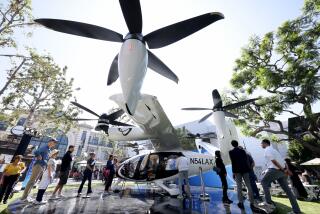Backing for Taxicab Deregulation Wanes
- Share via
Support in the City Council for a plan to deregulate the city’s taxi business appeared to erode last week as a phalanx of local cabdrivers appeared in the council chambers to complain that they already are suffering from too much competition.
“I haven’t been to the bank to make a deposit for many, many months,” said cabdriver William Fletcher, adding that his income had shrunk in the past two years because of a shrinking demand for his services.
“Right now, there’s not enough business to compete,” said Raz Mik, who said he often barely covered expenses while working 16-hour days.
City Councilman Chris Holden also expressed serious reservations about a new taxicab ordinance that was proposed last month by the city attorney’s office. The legislation was prepared at the direction of the City Council, whose members were dismayed last April by insurance lapses by the existing cab companies.
The proposed ordinance would eliminate a requirement that new cab companies prove a “need and necessity” for their service before being awarded permits. This would allow other independent companies to qualify for permits to seek fares in Pasadena, breaking up a virtual monopoly by a pair of companies owned by two brothers.
Holden expressed sympathy with the drivers and operators. “These are not the best of times economically,” he said. “I don’t have the feeling that change would be beneficial now.”
The council postponed a vote on the measure until Oct. 8.
The BTC and CTS Cab Cos., owned by Masood and Mahmood Babaeian, are the only companies legally operating in the city.
Representatives of the companies, which operate cabs under the names of Checker Cab, Pasadena Taxi, Yellow Cab and Red Top Cab, insisted that there is no “need and necessity” for new cab companies in the city.
In fact, said Neil Barker, the companies’ lawyer, the taxicab market is already being eroded by shuttle services, limousines and the city’s Dial-A-Ride system.
“More competition sounds like a good thing,” Barker said. “This country was based on competition. But look what’s going on behind the picture.”
Aside from the airport shuttles and limousines, he said, BTC and CTS also face increased competition from the proposed “circulator” bus service in the city’s commercial districts. The companies also have lost about 52,000 rides a year to an independent service providing transportation to hospitals and clinics, he said.
Two dozen cabdrivers, dressed in ties and white shirts and sitting in a tight group at the rear of the council chambers, spoke of long hours without fares. They also expressed worries about the effects of unfettered competition on cab service.
“Too many cabs will mean chaos, fights and vandalism,” said one driver.
Anni Oshita, an owner-driver, said she pays $40 a day to Checker Cab for dispatch service, insurance, advertising and other expenses. She said she must also pay for gas and maintenance out of her proceeds.
“I used to work maybe eight hours a day, and that was enough to support me and my two kids,” she said. “Now I find myself working 16 or 18 hours. Bringing in more cabs will only make me earn less.”
However, Councilman William Paparian, who suggested in April that the city allow other companies to operate, expressed skepticism about the companies’ hardships, even while conceding he was “not unmoved” by their appeals.
“It’s a pretty emotional appeal to have cabdrivers come up and sing the blues,” he said after the meeting.
But Paparian said the city should not support monopolies. “Competition is always healthy,” he said. “It always breeds better service.”
The Babaeian brothers have had a “stranglehold” on the city’s taxicab market, jeopardizing cab service when the companies ran into insurance problems, Paparian said.
In 1988 and 1990, the companies spent brief periods insufficiently insured, either because of invalid insurance certificates or cancelled policies, said Mary Bradley, finance director.
“We were left with the choice of either leaving the cabs out there with no insurance or else shutting them down,” Bradley said. “It left us with the feeling that we were being held hostage to a certain extent.”
In both cases, the problems were quickly solved and cab service was not interrupted, Bradley said.
Scott Schaffer, general manager for the two companies, said the problems stemmed from instability in the insurance industry. “The whole insurance market has been crazy the past few years,” Schaffer said. “A lot of operators had those kinds of problems.”
Municipal Services Administrator Kabirr Faal said city staff determined that the need for cab service had increased because of new hotels and office buildings recently completed in the city.
But the cab company representatives insisted that business has not grown from such developments as the opening of the Huntington Ritz-Carlton Hotel or the Doubletree Hotel.
The two companies have permits to operate 71 cabs in the city but, because of market conditions, only operate 40, Schaffer said. “There’s insufficient demand,” he said.
Holden apparently agreed. “I go past the Doubletree every day,” he said. “I don’t see the taxis lined up outside. I don’t see people waiting for cabs.”
More to Read
Sign up for Essential California
The most important California stories and recommendations in your inbox every morning.
You may occasionally receive promotional content from the Los Angeles Times.










